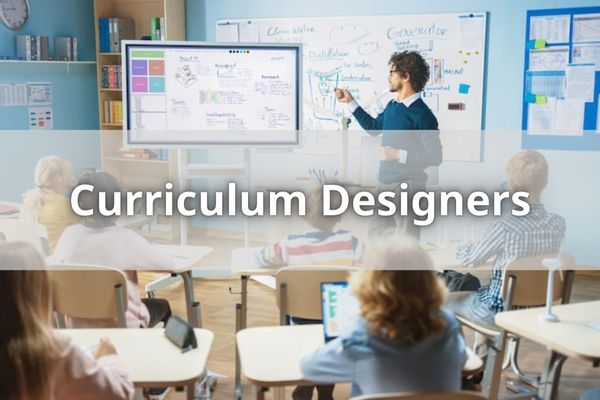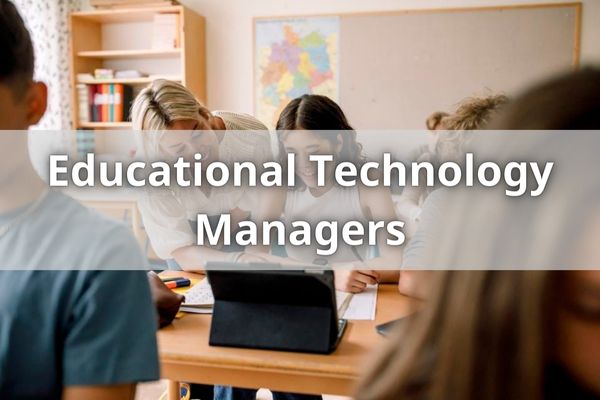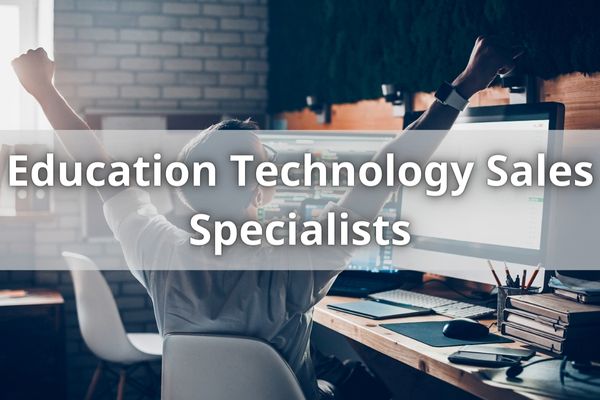Edtech Jobs For Teachers: Potential Of Education Technology
As the use of edtech continues to grow in schools and universities, teachers are increasingly presented with new opportunities for employment. Edtech jobs provide teachers with a chance to stay current on cutting-edge technology while utilizing their knowledge and experience as educators.
In this article, we’ll discuss the range of edtech jobs for teachers, from instructional designers to e-learning specialists. We’ll also explore how these roles can help teachers build their skillset and further develop their careers in education.
Online Course Design
Designing online courses for teachers can be a great way to expand their skills and increase job prospects. It requires both technical knowledge, such as coding or website building, and educational experience so that the course is engaging and effective.
There are several things to consider when creating an online course; it’s important to have clear goals in mind before beginning the process. The first step of designing an online course is researching the topic thoroughly. Gather all available material on the subject from various sources – textbooks, journal articles, videos etc. This helps you understand what information should be included in the course and allows you to create content which has not been covered by existing resources.
Once enough material has been gathered, begin organizing it into different modules based on topics or themes related to your subject matter. Creating materials for each module comes next; these could include text-based lectures with accompanying visuals like pictures or diagrams, interactive activities that allow students to practice their new knowledge or video lectures where they can follow along with an instructor’s explanation of a concept.
Finally, don’t forget about assessment – quizzes, exams and other tasks help ensure that learners have understood and retained key points throughout the online course. With thoughtful consideration of all aspects involved in creating an online course, teachers will find themselves well-equipped with new skills pertaining to edtech jobs!
Educational Software Developers
Moving on from discussing how to design an online course, let’s take a look at the other side of educational technology: developing software. Educational software developers play a vital role in creating applications and programs that help teachers do their job more efficiently and effectively.
The development process involves teams of programmers working together to create innovative tools for educators that can be used both in the classroom and virtually. These professionals must have extensive knowledge of programming languages as well as experience with web design and graphics. They must also have excellent problem-solving skills so they can debug any issues quickly.
Here are some key traits needed by educational software developers:
- Knowledge of coding languages like HTML, CSS, JavaScript, Python, etc.
- Proficiency in website design and graphic editing software such as Adobe Photoshop
- Ability to troubleshoot technical problems
- Excellent communication skills for collaborating with team members
- A passion for education tech and helping students learn
Educational software developers make it possible for teachers to access the latest teaching resources and materials which makes lesson planning easier than ever before. With their expertise in programming, designers are able to create custom applications tailored specifically to meet the needs of instructors around the world.
Being part of this exciting field is definitely rewarding!
Curriculum Designers

As teachers, our primary goal is to help students learn and develop. That’s why the role of curriculum designers can be so crucial for educators – they are responsible for creating materials that will inform and engage learners.
Whether it’s a digital textbook or an interactive game, these resources give teachers powerful tools to reach their students in unique ways.
Curriculum designers must have a deep understanding of learning theories and instructional design principles to create engaging experiences which align with educational goals. They need to work creatively within constraints like limited technology, budget restrictions, and time restraints while producing high-quality products. Additionally, they should be knowledgeable about current trends in edtech and able to collaborate effectively with teams of developers, editors, writers, illustrators, and more.
For those who thrive on working collaboratively and pushing the boundaries of how we teach, becoming a curriculum designer could offer a rewarding career path. By joining the edtech industry as one of these professionals you’d get the opportunity to make meaningful contributions towards helping students succeed in the classroom.
Instructional Designers
As schools and universities around the world become more technology-focused, there’s a growing demand for edtech professionals to fill roles that support teachers in their work. Instructional designers are one such example; they bridge the gap between educational theory and practical application by creating engaging learning experiences.
Not only do instructional designers need a deep understanding of pedagogy, but they must also be comfortable using various tools and programs to create interactive content. Instructional design is an interdisciplinary field combining elements from psychology, communication studies, multimedia production, and education itself. It requires the ability to think critically about how people learn best, as well as the technical know-how needed to develop activities that help students understand complex concepts.
By incorporating different media into course materials – like videos or podcasts – instructional designers can make lessons both entertaining and effective. The role of an instructional designer often extends beyond simply developing lesson plans; they may also serve as consultants on curricular projects or provide feedback on existing initiatives.
They’re responsible for researching new tools and technologies that can aid teaching efforts while staying mindful of cost concerns. For these reasons, it’s essential for instructional designers to have excellent problem-solving skills along with a creative flair when designing educational material.
Educational Technology Consultants
Instructional Designers are experts in creating learning experiences, but Educational Technology Consultants take those designs and make them a reality.
As the bridge between teachers and technology, ETCs ensure that tech solutions meet educational goals by providing training on how to use them effectively. They also provide technical support for existing systems and troubleshoot any issues that arise.
ETCs often have backgrounds in both education and information technology so they can understand their clients’ needs from multiple perspectives. This role requires excellent interpersonal skills as well as strong problem-solving abilities.
These professionals must be patient and able to explain complex concepts clearly in order to help people of all ages get the most out of their technological resources.
To thrive in this field, one must possess an aptitude for understanding new technologies quickly while also having a passion for teaching others how to use these tools in meaningful ways. It is essential that an ETC stay up-to-date with current trends and advancements in edtech so they can offer the best possible advice when helping teachers choose appropriate solutions for their classrooms or schools.
With such knowledge, comes great responsibility; it’s the consultant’s job to guide educators through the process of selecting and implementing the right technology at the right time.
Virtual Teaching And Learning Specialists
Virtual Teaching and Learning Specialists are in high demand as the edtech job market continues to grow. These professionals must be adept at using technology tools, platforms, and applications to facilitate learning for students, teachers, and administrators alike. They should also have a strong understanding of educational research so that they can apply it to innovative teaching methods.
The duties of a Virtual Teaching and Learning Specialist include:
- Developing creative lesson plans incorporating digital media into instruction
- Enhancing classroom management through virtual education initiatives
- Designing individualized support plans according to student need
- Identifying resources for utilization by instructors or administration staff
- Assisting with troubleshooting technical issues related to educational software programs
By collaborating with other educators and embracing new technologies, these professionals help ensure that all learners receive an effective education regardless of their location or circumstances.
The work done by Virtual Teaching & Learning Specialists is critical in creating engaging long distance learning experiences which promote meaningful connection among teachers and students.
Edtech Content Writers

Following virtual teaching and learning specialists, edtech content writers are another important job opportunity in the education technology sector. These professionals write engaging educational material that can be used as digital supplements to traditional textbooks or stand-alone resources within a school’s curriculum.
Content writers must have comprehensive knowledge of their subject matter, as well as an understanding of how students learn best and how to effectively communicate information through text. Edtech content writing requires a specific set of skills; for example, those who wish to pursue this type of work should have superior grammar, spelling and punctuation abilities. They also need to be able to develop creative topics and angles from which to approach them, while presenting clear instruction on complicated concepts.
Additionally, it is helpful if applicants possess strong research capabilities so they can accurately back up their claims with facts and figures. Content writers often collaborate with other educators such as teachers and professors – making teamwork a key attribute for any potential hires. Furthermore, being technologically savvy is essential since most materials are produced digitally today.
With these qualifications in hand, one can build a rewarding career crafting quality educational content that helps learners reach their full potentials.
Educational Technology Trainers
Educational Technology Trainers are an important part of the edtech industry. They have the knowledge and expertise to help teachers understand how to use various educational technology tools in their classroom instruction. These professionals can provide guidance on everything from basic computer skills, to more advanced ways of integrating new technologies into lesson plans.
Trainers typically begin by assessing a teacher’s current level of proficiency with technology. This helps them determine which aspects need improvement and what types of resources may be available for further training. Once they get an idea of where the teacher needs help, trainers will then create individualized learning plans based on that information.
These plans often include activities such as webinars, tutorials, workshops, and other forms of professional development designed to enhance the teacher’s ability to work with technology-based materials.
In addition to providing technical support, Educational Technology Trainers also serve as mentors. They offer advice and feedback on teaching strategies related to edtech implementation, helping teachers stay up-to-date on trends while developing their own unique approaches to using tech in the classroom.
Educators who receive this type of ongoing support report higher levels of satisfaction with both their students’ outcomes and their own job performance.
Learning Management System Specialists

Learning Management System (LMS) Specialists play a key role in the edtech industry for teachers. They are responsible for managing, maintaining and troubleshooting any technical or operational issues related to LMSs.
An LMS Specialist must understand how different types of technology can be used in the classroom and should have knowledge of various software programs and online applications that support teaching activities. An ideal candidate will possess excellent communication skills as they need to be able to explain complex concepts to students, faculty, and staff.
Additionally, strong problem-solving abilities are critical since they’ll often have to diagnose problems quickly and implement solutions efficiently. It’s also important that an LMS Specialist is comfortable working with multiple teams simultaneously while helping them develop strategies around their respective learning management systems.
Having a thorough understanding of pedagogy practices helps ensure effective implementation of educational technologies within a school system. Ultimately, this expertise allows Schools and Universities to provide high quality experiences for both teachers and students alike.
Educational Technology Analysts
Learning management systems are a great way to help teachers organize and manage their classrooms, but there’s another job in the edtech world that can provide even more support: educational technology analysts. These professionals use data-driven analysis to help get the most out of digital learning tools for both students and educators alike.
Educational technology analysts have strong analytical skills, which they apply to study trends in student performance as well as areas where existing edtech solutions may be lacking or underutilized. They also serve as resources on best practices for using new technologies, such as virtual reality platforms for teaching science concepts or developing online course materials.
With these insights into how digital learning works – and what doesn’t work – they can recommend improvements to an organization’s current edtech setup or suggest entirely new solutions that might better meet their needs.
The ability to understand complex problems and come up with creative ideas is key when it comes to being a successful educational technology analyst. It requires having knowledge of not just specific software programs but also instructional design principles, curriculum development strategies and industry standards so that they can identify potential issues before they become roadblocks in implementation or usage.
To excel in this role, you must possess strong communication skills so you can effectively explain your findings to stakeholders who don’t necessarily have technical backgrounds.
Educational Technology Managers

Educational Technology Managers are responsible for leading the implementation of technology in educational settings. They must ensure that all systems and software being used by students, teachers, and administrators meet their needs. This includes managing an organization’s technology budget, keeping track of technological resources and ensuring they are up to date with current trends.
Educational Technology Managers also work closely with other departments within a school district or university setting to ensure that each department is getting the most out of its technological resources. They create plans to integrate technology into classrooms and staff development programs, as well as train faculty on how to use new technologies effectively. Additionally, Educational Technology Managers develop strategies for using data collected from various sources to make informed decisions about future investments in educational technology.
Duties may include participating in professional conferences related to education technology topics, maintaining relationships with vendors and suppliers, researching emerging technologies, providing technical support to users when needed and developing policies related to IT security and safety protocols.
The job requires strong organizational skills along with knowledge of hardware, software applications, networking concepts, programming languages and instruction design principles. With these skillsets combined together you can have a successful career path in this field helping others learn through modern methods.
Educational Technology Strategists
Moving from Educational Technology Managers to Educational Technology Strategists, we can see that these two roles have similar responsibilities but different focuses. Whereas managers oversee the technical aspects of edtech implementation and deployment within a school or district, strategists are more focused on how technology can be used to improve student outcomes by exploring new approaches and technologies.
Strategists must possess a strong knowledge base in educational technology as well as creativity so they can identify innovative solutions for improving teaching methods and learning opportunities.
Here are some key elements of an effective educational technology strategist:
- Ability to recognize emerging trends in edtech
- Understanding of current pedagogical practices
- Analytical skills for conducting research and data analysis
- Capacity to develop strategies based on research & data findings
Educational technology strategists play an important role in ensuring schools meet their technological goals while also developing techniques that maximize resources and promote positive results among students. Through careful planning, strategists help educators make informed decisions about which tools will work best in their classrooms.
Education Technology Sales Specialists

Educational technology sales specialists are an important part of the edtech industry. They play a vital role in bringing innovative products to schools and teachers, enabling them to grow their students’ learning experiences.
Sales specialists must possess excellent communication skills and have a comprehensive understanding of the education technology sector. This includes knowledge of current trends, changes in policy, and advances in product development. Additionally, they need to be able to identify customer needs and effectively build relationships with potential buyers.
The job requires strong interpersonal as well as technical expertise:
| Interpersonal | Technical |
| Communication Skills | Knowledge of Education Technology Sector |
| Identify Customer Needs | Latest Trends & Changes In Policy |
| Build Relationships With Potential Buyers | Product Development Experiences |
| Presentation Skills & Public Speaking Ability | Understanding Of The Sales Cycle & Processes |
| Negotiation & Problem Solving Abilities | Familiarity With Industry Regulations And Compliance Requirements |
Sales specialists also need to understand how to navigate the sales cycle processes from start to finish. Additionally, they must be familiar with applicable industry regulations and compliance requirements for any given transaction or sale that is made. Finally, presentation skills and public speaking ability are essential components when it comes to convincing customers on why your product is right for them; solid negotiation and problem solving abilities can make all the difference here too.
As such, educational technology sales specialists provide invaluable support within the edtech community, ensuring that teachers have access to the best tools available so that they can fully engage their students in creative learning environments.
Educational Technology Recruiters
Educational technology recruiters are a great resource for teachers looking for edtech jobs. They specialize in finding tech-focused positions that fit the needs of their clients and can help match them with potential employers.
Here are three reasons why working with an edtech recruiter is beneficial:
- Time savings: Recruiters have access to job postings that may not be advertised publicly, saving you time spent searching online or through other channels.
- Expertise: A good recruiter will understand the technical aspects of the job market and be able to advise on salary expectations, career paths, and industry trends.
- Networking opportunities: Through networking events or referrals from past clients, recruiters can introduce candidates to new contacts they wouldn’t have had otherwise.
Whether you’re just starting out or exploring different options within your current field, educational technology recruiters offer valuable expertise when it comes to finding edtech jobs. Taking advantage of their services can give you peace of mind knowing that you’re making informed decisions throughout your search process.
Online Education Specialists

Online Education Specialists are an essential part of the edtech industry. They work with educators and administrators to develop strategies for using educational technology in classrooms, as well as provide support for teaching staff when there are difficulties or questions about new technologies.
These experts also create content such as videos, tutorials, and assessments that can be used by teachers to help their students learn more effectively. As a result of this expertise, Online Education Specialists have become increasingly important in the edtech space.
They must stay up-to-date on the latest trends and technological advances, while providing ongoing support for both teachers and students as they use these technologies in their learning environment. Additionally, these specialists must maintain strong relationships with all stakeholders involved in order to ensure that everyone is getting the most out of edtech services.
In turn, organizations rely heavily on Online Education Specialists to deliver results that will improve student achievement and teacher effectiveness. With the right tools and resources at their disposal, these professionals are able to make a real difference in the lives of those who benefit from education technology solutions.
By continuing to build upon current practices, they can only further strengthen their impact within this growing field.
Conclusion
Edtech jobs are an excellent way for teachers to gain valuable experience and knowledge in the field of educational technology. With a range of qualifications, internships, salary ranges and benefits available, there is sure to be something that fits your needs and goals.
Whether you’re looking to stay close to home or pursue a career abroad, edtech jobs offer exciting opportunities with plenty of room for growth. I encourage all educators to research this growing field and consider how it can help them reach their professional objectives.







